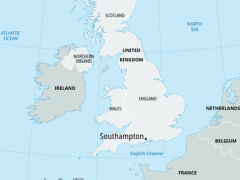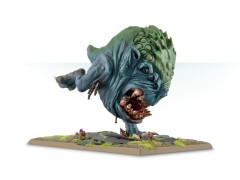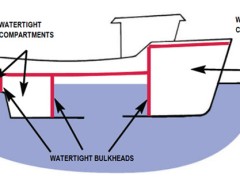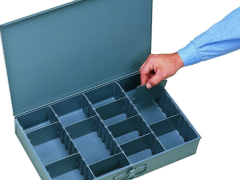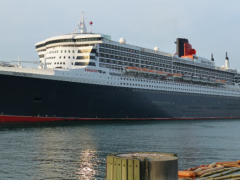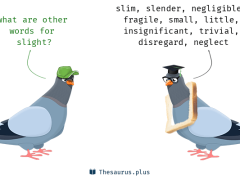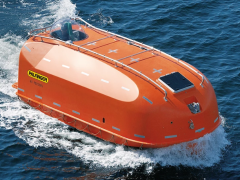Southampton [sauθˈæmptən] n. 南安普敦(英国港口城市)
colossal [kəˈlɔsəl] 庞大的,巨大的
【扩】tremendous 巨大的 enormous 巨大的,庞大的
【例】It requires government spending on a colossal scale.
这要求政府付出巨额开支。
watertight [ˈwɔːtətait] adj. 不漏水的
【构】water(水)+tight(牢固的,不透的)=watertight(不漏水的)
【扩】waterproof 不透水的
【搭】a watertight box 不漏水的箱子
* * *
A: Is this roof completely watertight?
B: Yes, I'm quite sure about it.
A:这屋顶一点儿也不漏吗?
B:是的,对此我十分确定。
* * *
compartment [kəmˈpɑːtmənt] n. 密封舱
flood [flʌd] v. 充满水
float [fləut] v. 漂浮,飘浮
【派】floating 漂浮的
【扩】flotation 漂浮 flotage 漂浮
【搭】on the float 漂浮着 float of capital 流动资金 float on air 兴高采烈
【例】The oil will float on water.
油会浮在水面上。
tragic [ˈtrædʒik] adj. 悲惨的
【派】tragically 悲剧地
【扩】miserable 悲惨的 forlorn 悲惨的
【搭】tragic day 悲惨的日子 tragic role 悲剧式角色
* * *
A: That's a tragic tale.
B: Yes, I can't accept the ending.
A:那是一个凄惨的故事。
B:是的,我接受不了那个结局。
* * *
liner [ˈlainə] n. 班船,大客轮,班机
voyage [ˈvɔidʒ] n. 航行,旅行
【扩】journey 旅行 trip 旅行
* * *
A: When I have a seasick, I'd often have some solid food instead of drink some liquids.
B: Me too. That also helps me in an uncomfortable voyage.
A:晕船的时候我一般吃一些固体食物,不喝任何液体。
B:我也是,当我旅行不舒服的时候,这个方法对我也很有作用。
* * *
iceberg [ˈaisbəːɡ] n. 冰山
lookout [ˈlukaut] n. 瞭望员
collision [kəˈliʒən] n. 碰撞
narrowly [ˈnærəuli] adv. 刚刚,勉强地
【扩】all but 差一点儿
【搭】narrowly win 险胜 narrowly escape 勉强逃脱
【例】We narrowly missed hitting the other car.
我们差一点儿撞上另一辆车。
miss [mis] v. 避开,错过
slight [slait] adj. 轻微的
【派】slightly 轻微地
【扩】soupcon 少量
* * *
A: Not too hot, please.
B: OK. We'll make slight hot.
A:请不要做得太辣。
B:好的,我们会为您做微辣的。
* * *
tremble [ˈtrembl] v. 震颤
【扩】quaver 颤抖 quake 震颤
* * *
A: His voice trembled with anger.
B: What made him so angry?
A:他的声音因为愤怒而发抖。
B:什么事情让他这么生气?
* * *
faint [feint] adj. 微弱的
【派】faintly 微弱地 faintness 微弱
【扩】feeble 虚弱的
【例】I heard a faint sound in the distance.
我听到远处有个微弱的声音。
horror [ˈhɔrə] n. 恐惧
abandon [əˈbændən] v. 抛弃
【派】abandonment 抛弃,放纵
【扩】discard 抛弃
【搭】abandon oneself to 沉湎于
【例】We should abandon outdated conventions and bad customs.
我们应该抛弃陈规陋习。
plunge [plʌndʒ] v. 投入,跳入,陷入
【派】plunger 活塞
【扩】tangle 陷入
【搭】at a plunge 进退两难 plunge into 闯进
lifeboat [ˈlaifbəut] n. 救生船
noun [专属名词]南安普敦(英国港市) - The ship is berthed at Southampton.
adjective [原级]巨大的,庞大的;异常的,非常的;(建筑)(柱型)不止一层柱的,多层柱的;(雕像)至少有真人两倍大的 - There has been a colossal waste of public money.
adjective [原级](容器或房间)防漏水的,水密的;(理论、计划或协议)严密的,无懈可击的 - A watertight case, argument, or agreement is one that has been so carefully put together that nobody will be able to find a fault in it.
noun [集合/集体]隔层,分隔间;(飞机、轮船或火车上的)车厢,舱;区划 - A compartment is one of the separate spaces into which a railway carriage is divided.
verb [vt. 及物动词]分隔,划分 - The desk has a secret compartment.
verb [vt. 及物动词](使)淹没;泛滥;大量涌来,大量涌去;(感觉或回忆)涌上心头;(光线)倾泻,照亮;(使)溢流;(产后等)子宫出血过多,月经过多 - If something such as a river or a burst pipe floods an area that is usually dry or if the area floods, it becomes covered with water.
noun [具体名词]洪水,水灾;大批,大量(的人或事物);<文>(海洋、江河等)大水体 - If you say that a flood of people or things arrive somewhere, you are emphasizing that a very large number of them arrive there.
flood = floods 都对,都可以用,无区别
verb [vt. 及物动词](使)漂浮,(使)浮动;轻盈走动,飘然移动;提出(想法或计划);发行(股票)上市;使(货币汇率)自由浮动 - Something that floats lies on or just below the surface of a liquid when it is put in it and does not sink.
noun [抽象名词]彩车;鱼漂,浮子;(学游泳用的)浮板;<美,非正式>顶端加冰激凌的饮料;<英,非正式>(商店的)备用零钱;(公司股票)上市,开始发行 - A float is a light object that is used to help someone or something float.
adjective [原级]悲惨的,悲痛的,可悲的;悲剧的;糟透了的 - Tragic is used to refer to tragedy as a type of literature.
noun [专属名词]<澳新,非正式>无趣的人,不善社交的人 - He makes King Lear a truly tragic figure.
noun [专属名词]邮轮;衬里,内衬;细画笔,细漆刷;(不用渔网的海上)钓鱼船;觅踪雪貂 - Hundreds of small craft bobbed around the liner as it steamed into the harbour.
noun [专属名词](尤指坐船或飞往太空的)航行,旅行;(对某事或某人有大量新发现的)发现之旅 - He aims to follow Columbus's voyage to the West Indies.
verb [vi. 不及物动词]航行,远行 - Life is compared to voyage.
noun [专属名词]冰山;微露端倪的事物 - The above complaints are, I suspect, just the tip of the iceberg.
noun [具体名词]监视;监视哨;警戒;守望者;担心的事;前景 - A lookout is someone who is watching for danger in order to warn other people about it.
noun [具体名词]碰撞,相撞;冲突,抵触;争用 - A collision of cultures or ideas occurs when two very different cultures or people meet and conflict.
adverb [程度副词]刚好,勉强地;狭隘地,受限地;仔细地,严密地 - He grimaced and looked narrowly at his colleague.
- We won narrowly. 险胜
- He narrowly escaped drowning. 差点淹死(escaped drowning 逃脱溺水)
(only) just 写作替换
- She (only) failed in the exam. 刚好不及格
noun [专属名词]小姐(未婚女子)、女士,年轻未婚女子 - an unmarried woman or girl, esp a schoolgirl
verb [vt. 及物动词]想念,未击中,不懂;未做,错过 - If you miss a chance or opportunity, you fail to take advantage of it.
adjective [原级]轻微的,少量的;(人)瘦小的,纤弱的;(尤指创作)不深奥的,不重要的 - A slight person has a fairly thin and delicate looking body.
verb [vt. 及物动词]怠慢,轻视;<古>破坏,摧毁(防御工事) - If you are slighted, someone does or says something that insults you by treating you as if your views or feelings are not important.
noun [抽象名词]冒犯,冷落 - Slight is also a noun.
verb [vi. 不及物动词](因害怕、紧张、兴奋等)颤抖,哆嗦;颤动,轻轻摇晃;害怕,紧张;(声音)颤抖 - If something trembles, it shakes slightly.
noun [具体名词]颤抖,战栗; <非正式>震颤病 (the trembles);乳毒病(同 milk sickness) - Tremble is also a noun.
adjective [原级]模糊的,微弱的;微小的,可能性不大的;虚弱的,头晕目眩的;不热情的 - The heat made him feel faint.
noun [抽象名词]晕倒,昏厥 - His breathing became faint.
verb [vt. 及物动词]昏厥;<古>变得微弱,衰落;变得没有气力 - I think I'm going to faint.
noun [抽象名词]震惊,恐惧;惧怕,憎恶;恐怖性;极其不愉快的(或可怕的)经历;恐怖故事(或电影等);<非正式>调皮捣蛋的孩子 - If you have a horror of something, you are afraid of it or dislike it very much.
verb [vt. 及物动词]抛弃,遗弃;(因危险)离开,舍弃;中止,不再有;放弃(信念、信仰或看法);陷入,沉湎于(某种情感) - If you abandon an activity or piece of work, you stop doing it before it is finished.
noun [抽象名词]放任,放纵。 - If you say that someone does something with abandon, you mean that they behave in a wild, uncontrolled way and do not think or care about how they should behave.
verb [vt. 及物动词](使)突然向前倒下(跌落);猛推,猛插;投入(液体中以使淹没);(价值)猛跌;(剧烈)颠簸,震荡;(马)猛地用后腿直立;陡然向下倾斜;骤然陷入;(鲁莽地)开始;(使)投身,(使)突然开始从事;种下(植物) - If you plunge an object into something, you push it quickly or violently into it.
noun [具体名词](突然的)坠落;跳水,快速游泳;(价值或数量的)骤然下跌;突然陷入 - Plunge is also a noun.
adjective [原级](女式服装)领口低的(plunging) - His sudden plunge into the field of international diplomacy is a major surprise.
noun [专属名词][船][安全] 救生艇,救生船 - A lifeboat is a small boat that is carried on a ship, which people on the ship use to escape when the ship is in danger of sinking.
